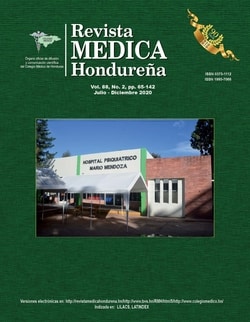The smallpox epidemic in the Mayoralty of Tegucigalpa year 1815
DOI:
https://doi.org/10.5377/rmh.v88i2.11497Keywords:
Epidemiology, History, Honduras, Organization and History, PoliciesAbstract
In 1815, a smallpox epidemic entered the Mayoralty of Tegucigalpa, which, despite the authorities’ efforts to spread the vaccine, wreaked havoc on the indigenous population. At the same time, in the winter of that year, the rains were less than usual, causing the failure of plantations, which led to a shortage of grain and widespread famine in the territory. In this scenario, Mayor Simón Gutiérrez was forced to collect tribute from indigenous peoples, politically maneuvering the situation to avoid any revolt by the population. The smallpox epidemic and famine exemplify the application of sanitary politics in colonial Honduras, highlighting the ways in which the individual actions of the officials were an exercise in the administration of the life of the inhabitants of the province. Similarly, by 2020 political and economic interests have interfered with effective prevention against COVID-19.
Downloads
358




